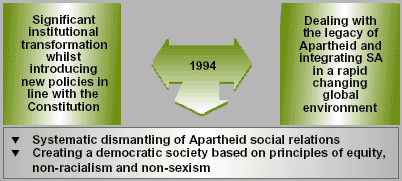
|
Towards a ten year review: synthesis report on implementation of government programmes, October 2003
Policy Co-ordination and Advisory Services (PCAS)
The Presidency, October 2003
This document was first posted on the GCIS website:
www.gcis.gov.za
SARPN has posted the report without its graphic intensive cover,
thereby reducing its size and making it more accessible to users
|
|
|
[Download report  - 1Mb ~ 6 min (117 pages)]
[ Share with a friend - 1Mb ~ 6 min (117 pages)]
[ Share with a friend  ]
]
|
[Cover pages  - 948Kb ~ 5 min (2 pages)] - 948Kb ~ 5 min (2 pages)]
Preface
Introduction  - 97Kb ~ 1 min (7 pages) - 97Kb ~ 1 min (7 pages)
- Research strategy
- The Human Development Indicators
- What the democratic State inherited
- Nature of the State
Themes  - 558Kb ~ 3 min (64 pages) - 558Kb ~ 3 min (64 pages)
- Governance
- Social
- Economic
- Justice, Crime Prevention and Security (JCPS)
- International Relations, Peace and Security (IRPS)
Findings  - 365Kb ~ 2 min (30 pages) - 365Kb ~ 2 min (30 pages)
- Influence of the State
- Understanding the performance of government
- Measuring impact
- The views of the public
- The social transition
- The Global Setting
- Main conclusion
Challenges and Opportunities  - 139Kb ~ 1 min (11 pages) - 139Kb ~ 1 min (11 pages)
- Framework of encompassing interest – a Social Compact
- Improving the performance of the State
- Addressing the consequences of the social transition
- Improving the regional environment and implementing the New Partnership for African Development (NEPAD)
Way Forward  - 52Kb < 1min (5 pages) - 52Kb < 1min (5 pages)
- Governance and Administration challenges for the next decade
- Social challenges for the next decade
- Economic challenges for the next decade
- JCPS challenges for the next decade
- IRPS challenges for the next decade
Annexures  - 172Kb ~ 1 min (22 pages) - 172Kb ~ 1 min (22 pages)
Preface
The attainment of democracy in
1994 presented government with
twin challenges: significant institutional
transformation and at the
same time introducing new policies
in line with the democratic
Constitution. Secondly, the
Government had to deal with the
legacy of Apartheid within South
Africa, whilst at the same time facing
new challenges of integrating
the country in a rapidly changing
global environment.
Since 1994, the State has deliberately
set out systematically and
deliberately to dismantle Apartheid
social relations and create a democratic
society based on the principles
of equity, non-racialism and
non-sexism.
In line with the prescripts of the
new Constitution, new policies and
programmes have been put in
place to dramatically improve the
quality of life of all the people. Key
to this programme of action has
been the extension of universal
franchise and the creation of a
democratic state. This has created
the requisite environment for the
country to address poverty and inequality, and to restore the dignity
of citizens.
This process, defined in the
Reconstruction and Development
Programme (RDP), has been
elaborated in all post-1994 policies.
The RDP identifies the following
key objectives:
- Meeting basic needs
- Building the economy
- Democratising the State and society
- Developing human resources,
- Nation building
In the elaboration of government
policy since 1994, the RDP objectives
have been elaborated upon
to include more specific priorities
of different clusters and depar tments.
After 1999, the policy
objectives of government were
consolidated into the priorities of
the five Cabinet clusters (see
Annexure I).
The Towards a Ten Year Review
was overseen by a steering group
of Ministers and received inputs
from individual departments in
government.The project outputs
were reviewed by the Directorsgeneral
(DG) clusters.
The Rev i ew is organised on comprehensive research conducted
within and outside of government,
and attempts to evaluate the extent
to which gove rnment has achieved
its objectives in the past decade.
More modestly, it explores the possible policy permutations for the
next decade in the context of the
imperatives of the Constitution and
the challenges of reconstruction
and development.
The Review primarily reflects on
government’s performance in realising
its objectives and does not
seek to examine in detail the evolution
of various sectors of society
in the period under review. It is
expected that organisations in the
areas of sport, the arts and culture,
universities, professionals
and the intelligentsia, trade unions, non-governmental organisations
(NGO’s) and communitybased
organisations (CBO’s) and
the private sector will conduct their
own assessments which, together
with this Review, will help inform
the nation’s evaluation of itself in
the First Decade of Freedom.
Such an evaluation will be an ongoing
process, which will achieve
definitive conclusions only after
data on the whole of the Decade
is available, which in turn will be
after the Decade has expired in
April 2004.
|

|
Joel Netshitenzhe -
Head, Policy Co-ordination and Advisory Services (PCAS),
The Presidency
Frank Chikane -
Director-General, The Presidency
[Preface  - 83Kb < 1min (2 pages)] - 83Kb < 1min (2 pages)]
|
|






